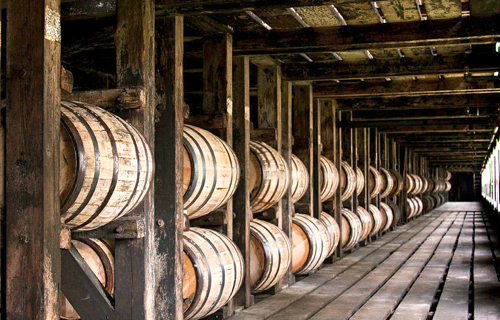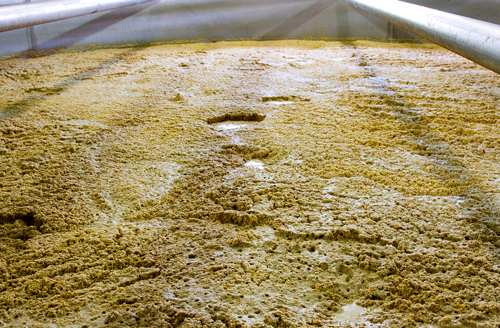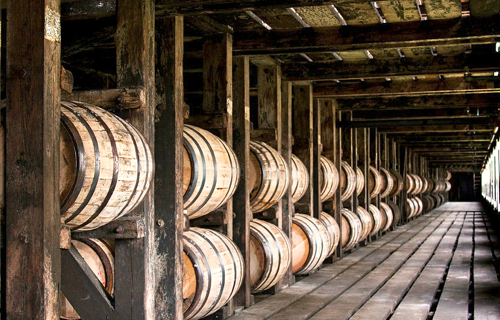 Aging bourbon at the Wild Turkey distillery.Photo: Michael KellstrandIn 2007, Grist writer David Roberts wrote about his less-than-successful hunt for an organic bourbon. Five years of boom-like growth in the organic sector later and — go figure — there’s still no organic bourbon on the U.S. market. In fact, finding any bourbon free of genetically engineered corn (as all certified organic products must be) has become increasingly difficult.
Aging bourbon at the Wild Turkey distillery.Photo: Michael KellstrandIn 2007, Grist writer David Roberts wrote about his less-than-successful hunt for an organic bourbon. Five years of boom-like growth in the organic sector later and — go figure — there’s still no organic bourbon on the U.S. market. In fact, finding any bourbon free of genetically engineered corn (as all certified organic products must be) has become increasingly difficult.
Bourbon gives us an interesting window into GMO grain, because the spirit must by definition be made with at least 51 percent corn. Consider the fact that 85 percent of the corn grown in the U.S. is now genetically engineered, and you can guess why organic bourbon won’t be appearing in a liquor store near you any time soon.
If you haven’t thought too much about the presence of GMOs in spirits, you’re not alone. Thad Vogler, owner of San Franscisco’s Bar Agricole, fills his bar with mainly small-batch, artisanally produced spirits; when it comes to bourbon, he’s “set the bar low” by settling for the two brands he can find that don’t use genetically engineered products: Wild Turkey and Four Roses.
“We perceive spirits as agricultural products,” says Vogler. “Indeed they are, but for arguably decades, they’ve been seen more as industrial products.”
The menu and wine list at Bar Agricole is 100 percent organic and biodynamic. But with spirits, adds Vogler, “it’s so far behind. If you say it’s 100 percent organic all you get is products from industrial organics,” like organic vodka, that he describes as “sort of like Trader Joe’s organics. It barely achieves certification and isn’t really interested in giving back to agriculture. It’s just interested in the label to get the marketing, to get the sales.”
“That said, we wanted to get behind the agriculture we agree with,” adds Vogler. “And we think that in Kentucky the decision to go no-GMO is indicative of an evolution of consciousness.”
This might be so, but if it weren’t for the international market, which maintains a decent-sized appetite for bourbon and other whiskey from the South, GMO-free bourbon might not exist at all.
In 2009, Brown-Forman, the maker of Jack Daniels — which is, granted, not a bourbon, but a Tennessee whiskey made with 80 percent corn — announced that it would end its commitment to using GMO-free corn [PDF]. In a statement, Brown-Forman wrote:
We have never been concerned by the use of GM grains in making bourbon and whiskey because none of the GM materials make it through the distilling process to the final product. However, in the year 2000, a number of our consumers, particularly those in Europe, expressed a preference for non-GM ingredients, and after considering those perceptions, we opted for only 100% non-genetically modified corn.
… Since 2000, the North American grain market has changed significantly. A rapidly shrinking supply of non-GM corn in North America is making it increasingly more difficult to source the quantity of high quality corn required for our bourbons and whiskeys.
(Note: This question of the genetic material passing through the distillation process came up repeatedly while I was researching the issue, and while it’s an important one, the fact is that neither Brown-Forman, nor the Kentucky Distillers Association (KDA), nor The Alcohol and Tobacco Tax and Trade Bureau (TTB) have made any scientific research public that proves their point. The KDA did not respond to my inquiries either.)
 Fermenting grain or “mash” in the Wild Turkey distillery.Photo: Michael KellstrandThe TTB also officially denied a growing number of requests to label spirits GMO-free. In the frequently asked questions page on the TTB website, the agency says that although they have received many requests, “TTB believes it is not necessary to mandate any bioengineered food labeling requirements at this time … This is consistent with the U.S. Food and Drug Administration’s position.”
Fermenting grain or “mash” in the Wild Turkey distillery.Photo: Michael KellstrandThe TTB also officially denied a growing number of requests to label spirits GMO-free. In the frequently asked questions page on the TTB website, the agency says that although they have received many requests, “TTB believes it is not necessary to mandate any bioengineered food labeling requirements at this time … This is consistent with the U.S. Food and Drug Administration’s position.”
Jim Rutledge, the 45-year veteran distiller at Four Roses, isn’t worried about the safety of GMO grains. However, the company — which was once owned by the now-defunct Seagrams — does work with one of the last remaining group of farmers in the Midwest who grow non-GMO corn for distillation, largely to appease the international markets, where 90 percent of their product is shipped.
“Seagrams had its own grain division started back in the 1960s,” he says, and although the growers formed their own company when Seagrams went under a few years back, Four Roses continues to pay a premium to ensure non-GMO corn production. Rutledge didn’t want to name the grain source publicly for fear the farmers would be approached by other, larger distillers. Four Roses only produces around 3 million “proof gallons,” which works out to around 300 million gallons of bourbon a year — a number easily dwarfed by companies like Jim Beam.
“The European and Asian markets won’t buy whiskey made with GMO corn,” says Rutledge. But, he adds, “due to cross-pollination, even the farmers not using GMO corn will end up with it eventually. I don’t know how many years we can continue like this.”
Rutledge predicts that by the time Four Roses is unable to get GMO-free corn, however, the larger distilleries will have “paved the way” and essentially changed the industry permanently. “For anyone who wants bourbon, it’ll be a GMO product,” he says. “But we’re a few years away from that now.”
Wild Turkey Master Distiller Jimmy Russell is a little more cautious. During a tour of the Lawrenceburg, Ky., distillery, he told photographer/blogger Michael Kellstrand why Wild Turkey doesn’t use GMO grains:
The whiskey distilled today will not become a bottled product for another four to 15 years. If a GMO grain is discovered to have an issue five years from now, or if the government decides any GMO products must be labeled as such, then the distillery would be in quite a bind with all that aging product now affected. The premium they pay for non-GMO grain is considered insurance against any possible issues later.
Colin O’Neil, regulatory policy analyst at the Center for Food Safety, says he hasn’t seen any science pointing to genetic material passing through the distillation process. But, as he sees it, that’s not the only cause for concern.
“To assume that the only real risk is contamination of genetic material ignores the fact that these crops by and large either produce an insecticide (which has been shown not to break down in the human gut) or they are engineered to withstand exposure to herbicide.” And farmers are spraying an increasing amount of Roundup and other weed killers as a result of herbicide-resistant “superweeds,” he points out.
“I don’t know what types of pesticide residues are on the corn that goes through the distillation process,” O’Neil adds, “but residue in any form presents an increased exposure to consumers.”
In the case of a product like bourbon, which prides itself on a heritage — and on a tried-and-true distillation method rooted in antiquity — the irony is hard to miss. But O’Neil takes it further: “It’s a fallacy to believe that bourbon is the same as it was before there were genetically engineered crops out there.”




